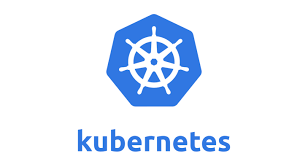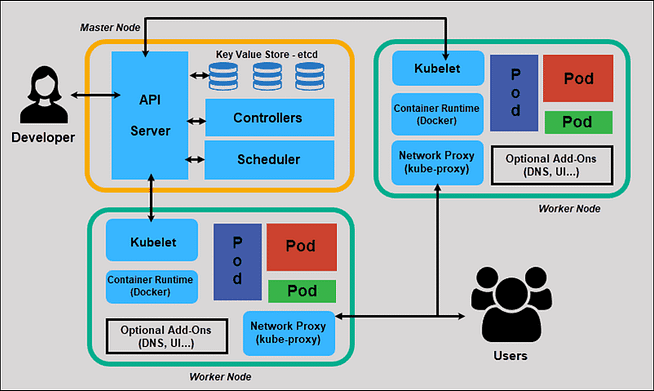
Kubernetes:Revolutionizing App Development and Delivery
Indroduction
Kubernetes Architecture
Kubernetes Benefits
Kubernetes and Application Development
Kubernetes and Application Delivery
Kubernetes and Release Management
Conclusion
Indroduction
Kubernetes is an open-source container orchestration system that automates the deployment, scaling, and management of containerized applications. It was originally developed by Google and is now maintained by the Cloud Native Computing Foundation (CNCF).
As the world of technology continues to evolve, businesses must keep up with the latest advancements to stay ahead of the competition. One such technology that is revolutionizing the application development, delivery, and release management processes is Kubernetes. take a deep dive into Kubernetes and how it is changing the landscape of modern software development. We will explore the architecture of Kubernetes and how it has changed the app development and delivery process, as well as the benefits of using Kubernetes for app development and delivery.
Kubernetes Architecture
Kubernetes has a distributed architecture that consists of a master node and worker nodes. The master node manages and controls the worker nodes, which are responsible for running the containerized applications. The master node consists of several components, including:

-
- API Server: The Kubernetes API server is the central component that exposes the Kubernetes API, which is used for communication between the master and worker nodes.
- etcd: etcd is a distributed key-value store that stores the configuration data for the entire Kubernetes cluster.
- Controller Manager: The controller manager is responsible for managing the various controllers that are used for different tasks, such as replicating containers, managing nodes, and managing services.
- Scheduler: The scheduler is responsible for scheduling containers to run on specific worker nodes based on their resource requirements
Kubernetes Benefits
Using Kubernetes has several benefits for application development and deployment, including:
-
- Scalability: Kubernetes allows for automatic scaling of containerized applications, ensuring that resources are allocated efficiently and effectively.
- Portability: Kubernetes is highly portable, allowing for easy migration of applications between different environments and cloud providers.
- Automation: Kubernetes automates many of the tasks involved in managing and deploying containerized applications, reducing the workload on development and operations teams.
- Resource Management: Kubernetes provides advanced resource management capabilities, allowing for efficient allocation of resources and ensuring that applications have access to the resources they need.
Kubernetes and Application Development
Kubernetes has revolutionized the application development process by providing a platform that enables developers to focus on writing code and building applications rather than worrying about infrastructure. Kubernetes simplifies the deployment process and makes it easier to manage and scale applications, allowing developers to focus on building better applications.
Kubernetes and Application Delivery
Kubernetes has also changed the way applications are delivered, making it easier to deploy applications to different environments and cloud providers. Kubernetes provides a consistent platform for deploying applications, regardless of the underlying infrastructure, which makes it easier to deliver applications to customers quickly and reliably.
Kubernetes and Release Management
Finally, Kubernetes has also changed the way applications are released, making it easier to roll out new features and updates without downtime. Kubernetes allows for canary deployments, which enable developers to release new features to a small subset of users before rolling out to the entire user base. This approach reduces the risk of downtime and allows developers to test new features in a real-world environment before rolling them out to all users.
Conclusion:
In conclusion, Kubernetes has revolutionized the way application development, delivery, and release management is done. With its architecture, it has brought the ease of automating the management of containerized applications and has become the de-facto standard for container orchestration. It is highly scalable, fault-tolerant, and helps in ensuring high availability of applications. Kubernetes has reduced the deployment times and efforts, increased agility, and made it easier to develop, deploy and manage applications.
However, the adoption of Kubernetes requires organizations to understand and learn its architecture, design, and implementation, which can be a challenge for some. Also, it requires organizations to have a good understanding of containers and containerization technologies, and how they work with Kubernetes.
Nevertheless, the benefits that Kubernetes brings in terms of increased efficiency, automation, scalability, and fault-tolerance are immense and make it a must-have technology for organizations that want to stay competitive and agile in the current fast-paced digital world. Therefore, businesses that have not yet adopted Kubernetes should consider it as a key technology in their IT strategy, and start exploring and learning its capabilities and benefits.
Further Readings
Cloud Migration Strategies to optimize cost
10 K8s Tools for Container Orchestration in 2023
AWS IAM Policies: Best Practices






2 Comments
Pingback:
Pingback: